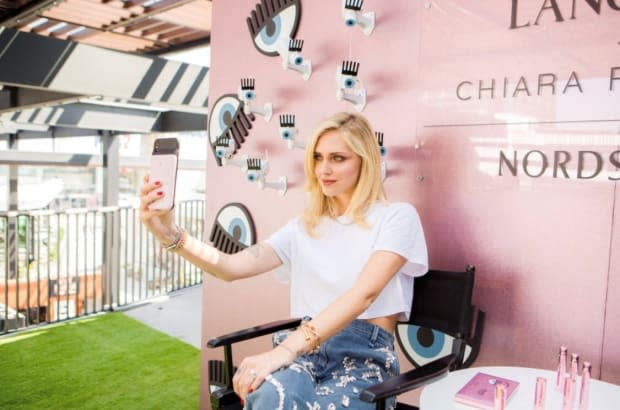As Fashion Retailers Expand Their Beauty Offerings, Are Influencers the Key to Getting Ahead?
Influencer trips — and brands — are trending in beauty, too.

Apparently, selling one category isn't enough for retailers anymore. A big phenomenon within the ever-changing consumer goods landscape over the past few years has been stores and e-commerce platforms initially known for their fashion and apparel offerings diversifying into different categories, especially beauty.
Net-a-Porter launched beauty in 2015; Revolve followed suit in 2016. Around the same time, Urban Outfitters and Anthropologie went from carrying a smattering of products near the checkout counter to investing in larger, more deliberate beauty sections in their stores and on their websites. Barneys and Saks Fifth Avenue have also ramped up their beauty offerings, as have Forever21, H&M, ASOS and & Other Stories on the more accessible end of the spectrum. So have indie e-commerce sites like Need Supply and The Dreslyn. Last year, Urban Outfitters launched Ohii, an in-house beauty line by product developers from Pat McGrath Labs and Glossier, and it quickly joined the ranks of Instagram's most ubiquitous beauty brands. This year, athleisure giant Lululemon entered the beauty space with its "Self Care" brand. Even Amazon has been working to court beauty shoppers. And those are just a few examples.
It makes sense that retailers would have high hopes for beauty. Online beauty sales are outpacing overall e-commerce sales growth and are reportedly expected to grow almost 28 percent this year. And, for brick-and-mortars, getting a high margin without sacrificing too much selling space is always a plus. But simply putting skin-care and cosmetic products on a shelf or an e-commerce site is not in itself necessarily enough to lure beauty shoppers away from beauty-specific retailer giants like Sephora and Ulta, or popular direct-to-consumer brands like Glossier and Kylie Cosmetics.
Related Articles
Are Influencer Brands the Key to Bringing Millennials to Department Stores?
The Skin-Care Industry Is Thriving — But How Long Can This Boom Last?
Lululemon Enters the Beauty Space With Gender-Neutral 'Self-Care' Products
That's why a department stores are expanding their beauty floors, offering special beauty services, erecting shop-in-shops and establishing exclusives with brands. It's why Saks offers Face Gym and CoolSculpting, and Nordstrom has Base Coat and recently had a natural beauty-themed Pop-In, Neiman Marcus has DreamDry and Valley Nails, and Bloomingdale's has a Clarins spa. Multibrand retailers also fight for exclusives, like being the only retailer in a certain region to carry Gucci cosmetics or Pat McGrath Labs.
The latest strategy, it seems? Influencers. Speaking of exclusives, in June, Nordstrom became the exclusive U.S. retailer for mega-influencer Chiara Ferragni's collaboration with Lancôme. The Seattle-based chain has made a big investment in influencer brands on the fashion side through partnerships with the likes of Chriselle Lim, Something Navy's Arielle Charnas, Gal Meets Glam's Julia Engel — and it's paid off. It's only natural that Nordstrom might hope to mimic that success on the beauty side.
"We're always working to bring in limited distribution and exclusive products in order to have a differentiated offer for our customers to discover when shopping with us," Gemma Lionello, EVP, GMM Accessories and Beauty for Nordstrom, tells Fashionista of the importance of exclusives to Nordstrom's beauty business. "Lancôme x Chiara generated a lot of buzz not only online but also in our stores." She adds that the collaboration has been successful from both a sales perspective and also in terms of customer engagement, and that its success has had a "halo effect," boosting sales of other Lancôme products as well.
"Influencers can be a powerful voice in the beauty world," she notes. "Having a strong brand partner like Lancôme and being aligned on the goals and objectives for this influencer collaboration was the key to the success of the Chiara launch. Chiara has a strong connection with her followers and they trust her opinion."

Then there's Revolve, which practically wrote the playbook on influencer marketing and collaborations. Since launching beauty three years ago, the now-billion-dollar public company has seamlessly integrated beauty into its influencer strategy.
"We know our customer is obsessed with beauty and we felt we could provide the same experience as we did with fashion," says Revolve Chief Brand Officer Raissa Gerona. "We knew the influencer program and relationship we have with the influencers can directly spill over into beauty." It began by working with the influencers it already had relationships with, such as Marianna Hewitt, who teamed up with the retailer for a curated beauty box, and expanded from there. Since so many influencers had begun tapping into the beauty space as a means of diversifying their own portfolios, the company saw an opportunity to work with new influencers and thus reach new fans.
Gerona has found that video and Instagram stories have resonated the most when it comes to beauty; Revolve Beauty has its own Instagram account with 104,000 followers. The company also integrates beauty into its famous influencer vacations and #RevolveFestival Coachella trips. Beauty brands from Revolve Beauty's roster contribute to goody bags for all the influencer attendees and, at #RevolveFestival specifically, Benefit has set up all-day brow bars at their hotel. "Brands want to participate in everything Revolve is doing," says Gerona. "They're so up for it because they have the opportunity to have exposure."
Revolve also works with influencers to curate beauty boxes of their favorite products. "That's been very successful for us," notes Revolve beauty buyer Kandice Hansen. One of those influencers was Hewitt, who subsequently launched her own skin-care line Summer Fridays. Influencers and Instagram actually factor heavily into the buy for Revolve Beauty, too. "We're always on the lookout for influencers launching a new brand; we want to be as supportive as possible," says Hansen. She notes influencer Negin Mirsalehi hair-care line Gisou as a "perfect example of a top-selling brand on the beauty side."
Hansen also uses Instagram as a resource to discover new brands, so it's no surprise that Revolve Beauty is stocked with influencer favorites like Supergoop, Dr. Barbara Sturm and Ouai. She even takes Instagrammable packaging into consideration when scouting new labels. "If it's something she wants to take a shelfie with, we're confident in introducing that to the site," she notes.
As many already have with fashion, we could see other companies following Revolve's lead in beauty, too.
Even Net-a-Porter is beginning to incorporate influencers into its growing luxury beauty business. In May, the retailer hosted a group of influencers and models like Romee Strijd, Harley Viera-Newton and Pernille Teisbaek on a three-day trip to Greece to promote its Jet-a-Porter vacation shop, and among the brands sponsoring the trip was Sisley-Paris. The high-end beauty brand gifted guests with product as well as setting up a spa for facials and makeup consultations.
And Amazon is getting on the celebrity/influencer beauty brand bandwagon — albeit on a very large scale — as the recently-announced exclusive retailer of Lady Gaga's new makeup line.
Clearly, competition is ramping in this space — all the more reason for retailers to get even more aggressive with their influencer strategies.
Never miss the latest fashion industry news. Sign up for the Fashionista daily newsletter.
